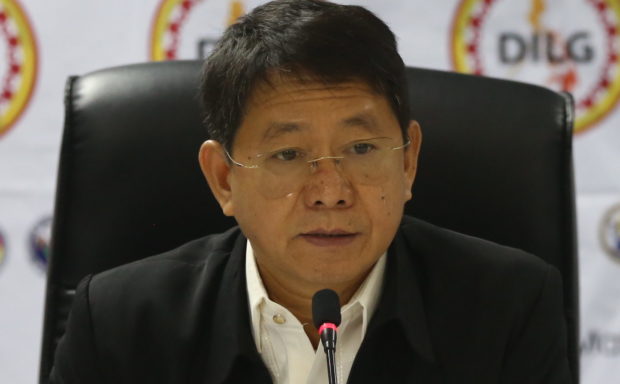Año says gov’t may no longer appeal SC decision on anti-terror law
MANILA, Philippines — Interior Secretary Eduardo Año said Sunday executive officials may no longer appeal the decision of the Supreme Court (SC) which declared as unconstitutional two portions of the Anti Terrorism Act of 2020.
Año said he is pleased with the decision of the High Court because it declared the anti-terror law constitutional except for two “minimal items.”
But asked if they will still appeal the decision, Año said: “Sa tingin ko, magmimeet muna ang Anti-Terrorism Council sa pangunguna ni Executive Secretary Salvador Medialdea at pag-uusapan namin ito, pero sa tingin ko hindi na kami mag-aapeal sapagkat masaya na kami dito sa ruling ng Supreme Court.”
(I think the Anti-Terrorism Council would still have to meet regarding that but I believe we will no longer appeal it because we are already pleased with the decision.)
The High Court has declared as unconstitutional for “being overboard and violative of freedom of expression” the qualifier to a portion of Section 4 defining terrorism, which reads: “Provided, That, terrorism as defined in this section shall not include advocacy, protest, dissent, stoppage of work, industrial or mass action, and other similar exercises of civil and political rights, which are not intended to cause death or serious physical harm to a person, to endanger a person’s life, or to create a serious risk to public safety.”
Article continues after this advertisementAño agreed that these actions are just manifestations of freedom of expression.
Article continues after this advertisement“Ang sabi ng Supreme Court ay tanggalin ang qualifier na ‘yan kasi unconstitutional, which we agree naman kasi ito naman ay manifestation of freedom of expression. Ibig sabihin pwede kang magrally, pwede kang magsalita, kahit anong sabihin mo, it will not be interpreted as causing injury to other people. So okay lang naman ‘yun,” he said.
(The SC said we should remove the qualifier because it is unconstitutional, and we agree with that because these are just manifestations of freedom of expression. This means you can hold rallies and say anything but it will not be interpreted as causing injury to other people. So that is just fine.)
He also said that the removal of the qualifier will set a clear line between activists and terrorists.
“‘Yung tinanggal na item dito or provision, that will now really differentiate an activist from a terrorist. Ibig sabihin kung activist ka, magrally ka dyan, magdemonstrate ka dyan, magboycott ka ng trabaho, walang problema yan. You are not a terrorist,” said Año.
(With this item removed, the law will now really differentiate an activist from a terrorist. This means if you are an activist, you can hold rallies or demonstrations and boycott jobs but not encounter problems. You won’t be tagged a terrorist.)
“Kahit ano pa ‘yung pinagsasabi mo, pinagmumura mo dyan, ibagsak ang gobyerno, hindi ka terrorist dyan,” he added.
(No matter what you say, and even if you curse and call to overthrow the government, you are not a terrorist.)
Meanwhile, the SC also declared as unconstitutional the second method for designation under Section 25 which states that: “Request for designations by other jurisdictions or supranational jurisdictions may be adopted by the ATC after determination that the proposed designee meets the criteria for designation of UNSCR (United Nations Security Council Resolution) No. 1373.”
